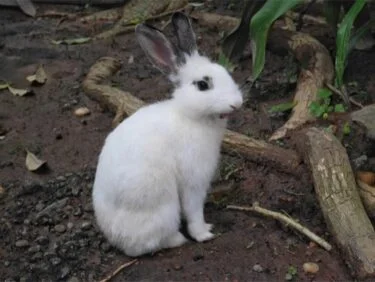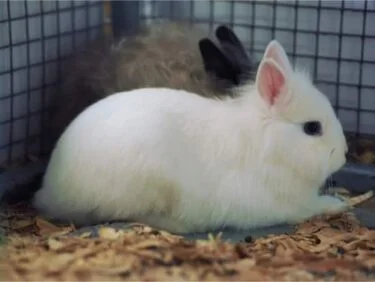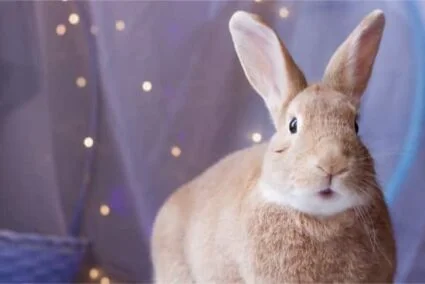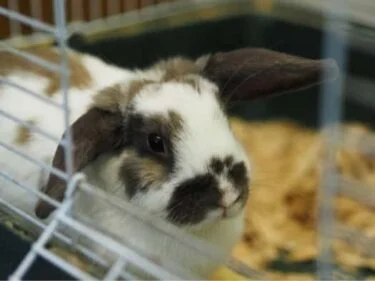After your rabbit eats, you may have noticed certain noises. Their heads bob up and down, and they make a distinct sound. It’s enough to make you think that your rabbit has a bout of the hiccups.
A hiccup from a rabbit is the result of a diaphragm muscle spasm. This often follows eating quickly. If a rabbit eats faster than they can digest, they’ll swallow air and irritate their diaphragm. Rabbits cannot belch or vomit. This makes hiccups the only way to expel this air.
A short bout of hiccups is nothing to worry about. The symptoms will pass within a few minutes. If the hiccups persist, check your rabbit’s health. It’s rare, but hiccups can be linked to respiratory of gastrointestinal disorders. This guide will help you recognize hiccups and the warning symptoms.
Do Rabbits Get the Hiccups?
Rabbits can get the hiccups, but they may or may not be audible. The sound of a hiccup is similar to that of a human, just quieter. If your rabbit is hiccupping silently, they’ll bob their head up and down.
Rabbits hiccup quickly, so it can be worrying. If you have never seen your bunny hiccup before, you may think they’re having a seizure.
If the hiccups only last a few minutes, there’s nothing to worry about. If they persist for days, or your bunny acts strangely in other ways, investigate further.
What Causes Hiccups in Rabbits?
A hiccup is a diaphragm muscle spasm. Every time your bunny’s body experiences this spasm, their vocal cords will close suddenly. This creates the, “hic” sound.
Hiccups in a rabbit are commonly associated with food. If your rabbit hiccups after eating, they likely ate too fast. If your rabbit eats at a great pace, they’ll also swallow air. This irritates the diaphragm.
This is common in young rabbits. Baby bunnies are insecure about food. They haven’t had time to bond with you fully. They’ll eat quickly so the food cannot be taken away from them.
In addition to this, baby bunnies eat more pellets than hay or fresh vegetables. Pellets can be eaten much faster than these alternatives. Your rabbit will barely stop to chew.
Don’t worry as your rabbit will soon start to trust you. They’ll realize that you provide food, and don’t remove it. This means they’ll start eating at a more socially acceptable speed.

If you don’t feel that your rabbit is eating quickly, look at what you’re feeding them. Certain foods irritate a rabbit’s diaphragm, even if they enjoy them. If you offer you bunny a new vegetable and it makes them hiccup, it’s best avoided.
Play and exercise could also cause hiccups. If your rabbit is particularly exuberant outdoors, they’ll swallow a lot of air. As discussed, this causes hiccups.
How Long Do Hiccups in Rabbits Last?
Hiccups should be a transient and temporary issue for rabbits. Their diaphragm muscle will calm down, and the hiccups will stop of their own accord. This is usually within a couple of minutes. Less if your rabbit stays still.
If the hiccups continue longer than a few hours, investigate a little further. Your bunny may have an underlying health concern that’s magnifying the problem.
You should also look out for other behaviors that may accompany the hiccups. If your rabbit has any of the following ailments, they need help:
- Refusal or inability to eat or drink
- Inability to eliminate, especially feces
- Signs of physical pain, such as grinding teeth or hunching over
These are suggestions that your rabbit is having a problem with their digestion. The hiccups will be a symptom of this, but typically the least of your concerns.
How to Stop Rabbit Hiccups
Never hold your bunny’s nose in an attempt to make them hold their breath. They’ll be terrified, and may never trust you again.
Scaring a rabbit is a terrible idea. They’re already frightened of you, due to your size. Deliberately making a bunny jump will not help their hiccups, and it will traumatize them.
The best cure for hiccups will always be time. If you’re patient, your rabbit will typically stop hiccupping of their own accord. You don’t need to worry unless the issue is constant and persistent. You can, theoretically, help them out though.
Gently place two fingers on your rabbit’s diaphragm. This is found just above the liver, and below the heart and lungs. Refer to this diagram from Zoology Notes if you need more help.
Once you find the diaphragm, push with the tips of your fingers. Rabbits hate being touched on their underside already, and hurting them will make it worse.
If your rabbit has a minor case of the hiccups, this will dispel any trapped air. They should stop hiccupping immediately. If the diaphragm is hard or distended, your bunny has a digestive issue.
Are Hiccups Dangerous for Rabbits?
Hiccups in rabbits are harmless until they’re dangerous. This may sound unhelpful, but allow us to elaborate. Think about a case of the hiccups that your child may have. If they’ve just eaten, and start to hiccup, you’ll think nothing of it. They just ate too fast, or were active too soon after eating.
If somebody hiccups constantly, for several hours, it becomes concerning. If the issue persists for several days, it’s time for a doctor. The same applies to rabbits.
With bunnies, there is an additional consideration to make. Rabbits cannot purge their stomachs the way that humans can. Rabbits are incapable of belching or vomiting. This means that a digestive problem must be addressed directly.

It’s not just bunny digestion that raises concerns, though. Sometimes, a bunny hiccups due to an underlying respiratory problem.
Ask yourself if your rabbit is even hiccupping at all. They may be shaking. This could be a result of low body temperature, they may be stressed, or it could even be a seizure.
Take your rabbit’s temperature. If it’s between 101-103 degrees Fahrenheit, body heat is not a problem. Also, assess any reason why they may be distressed. If applicable, return them to their hutch to calm down.
If hiccups last for days without a good explanation, your rabbit’s health is in danger. This is the point that you need to intervene without further delay.
Respiratory Conditions Related to Hiccups in Rabbits
Reparatory problems are common in rabbits. These are known as snuffles, due to the noise your rabbit will make.
Hiccups arise when a poorly rabbit fills their lungs with air, trying to breathe easier. This air also floods their stomach, causing the diaphragm spasm associated with hiccupping.
Some rabbits will overcome a respiratory infection of their own accord. A healthy adult bunny will have sufficient immunity to combat this. Symptoms of respiratory infection in rabbits are:
- Discharge from the eyes or nose. Clean this up, before your rabbit rubs it on their fur.
- Sneezing, and releasing white discharge. Dry sneezes are more readily associated with allergic reactions. Here’s a guide to sneezing in rabbits, and what it means.
- Tilting the head and scratching the ears. This suggests that the infection is spreading to the ears.
- Lethargy and reluctance to be handled. One day of this is to be expected, maybe two. If it continues, it’s more concerning.
- Tilting the head back. This is your rabbit trying to take a deep breath and clear their sinuses. Due to the amount of air they’re taking in, hiccupping will follow.
- Reluctance to eat. Rabbits lose their appetite when under the weather. Like all small animals, they must not last longer than 24 hours.
If your rabbit is gasping and breathing through their mouth, you should definitely see a vet. This will not just lead to mildly irritating hiccups. Your rabbit is unable to gain enough air through their nose to breathe.
In other circumstances, watch your bunny for a day or two. If they start to act more like their old selves, they’re successfully fighting the infection. Once they recover, the hiccups will subside.
Digestive Conditions Related to Hiccups in Rabbits
Digestive issues in rabbits are not something to take lightly. If your rabbit has a blockage in their digestive tract, it quickly becomes fatal. These blockages can sometimes lead to constant hiccupping.
The most common condition that impacts a bunny’s digestion is gastrointestinal stasis. The House Rabbit Society describes this as ‘the silent killer,’ which tells you everything.
We’ve suggested touching your rabbit’s diaphragm to aid their hiccups. While doing so, acknowledge how it feels. If your rabbit’s belly is hard, or they cry when you touch them, call a vet.
This hardness and hiccupping, means that your bunny has a blockage in their gut. This is preventing them from eating and eliminating. Your pet’s stomach may also gurgle loudly during this time.
With timely professional care, your rabbit will recover. They will need prescription drugs to clear their digestive tract, and painkillers. Depending on how long it’s been since they ate, the rabbit may also need syringe feeding.
Just like hiccups, gastrointestinal stasis can be avoided with an appropriate diet. If your rabbit doesn’t need pellets, replace them with high-quality hay. This will keep your bunny happy, and their gut healthy.
Hiccups vs. Seizures in Rabbits
It’s possible to mistake a hiccup for a bunny for a seizure. One of these scenarios is considerably more concerning than the other.
If a rabbit is hiccupping, they’ll bob their head back and forth. This will not be a particularly violent action. If you blink, you may miss it.
A seizure is different because your rabbit’s entire body will shake. Their eyes may roll back in their head. Your bunny may also paddle their legs, drool and squeak.
You’ll be surprised at how much a rabbit can move under a seizure, too. If you see such an issue coming on, clear plenty of space.
The other sizable difference between hiccups and seizures is the time they take. Hiccups are constant but very short motions. The hiccup itself will last seconds. However, they can repeat for second, minutes or hours.
Seizures are different. They last less than a minute, and they’re often as short as 20 seconds. The seizure will be constant during this time, though. A rabbit seizure is frightening, and unmistakable to anybody that has witnessed one.
If your bunny is having seizures, learn why. They may stress or lifestyle-related, or due to an underlying medical condition. Unlike hiccups, seizures are a life-threatening issue.
My Rabbit Has Recurrent Hiccups
Some rabbits have a clean bill of health, but experience recurrent bouts of hiccups. This can get annoying for your bunny to deal with.
In such an instance, you need to look at making some lifestyle changes. More specifically, you need to review their diet, and their mental health.
Let’s elaborate further on what we can do prevent hiccups from recurring over and over.
Hiccups Caused by a Rabbit’s Diet
Diet is an integral part of any rabbit’s health. Bunnies do not hiccup due to allergy, but they may be sensitive to certain foods. You can learn what these are through a process of elimination.
If your rabbit is an adult, start by removing pellets from their diet. Unless your bunny has a health condition that requires pellets, such as arthritis, they’re inessential. Adult rabbits can happily live on unlimited hay.

Hay, by its very nature, takes longer to eat. Your rabbit is likelier to munch at a sedate pace if chewing on hay. This reduces the likelihood of swallowing air.
Next, look at the vegetables that you offer. Lettuce is dismissed as ‘rabbit food’ by carnivores, but some varieties do not agree with bunnies. Iceberg lettuce, for example, contains a fluid called lactucarium. This irritates a rabbit’s stomach.
Ask yourself if you’re feeding your bunny too much. A rabbit that’s uncomfortably full will experience hiccups. Unlimited hay is fine. Fresh veg should be limited to a tablespoon per 2 lbs. of body weight.
Hiccups Caused by a Rabbit’s Mental and Emotional Health
You also ensure that your rabbit isn’t stressed. Hiccups are not a direct response to anxiety. Feelings of insecurity can lead to behaviors that cause hiccups, though.
We have discussed how baby bunnies eat quickly through insecurity. Most adult rabbits outgrow this, but only if they’re given a reason to. Rabbits need security and routine in their life.
If you are erratic with a rabbit’s schedule, this will make them nervous. They won’t feel safe in knowing when their next meal is coming. They’ll be much happier if they can set their metaphorical watch by feeding times.
The best time to feed a rabbit is early evening, when they rise from their long daytime sleep. They’ll typically wake up hungry, and will enjoy this as a routine.
If you teach your rabbit that the early evening means food, then being let out of their hutch for exercise, they’ll quickly relax. This, in turn, will be reflected in their habits.
You may not be the problem, though. If your rabbit shares a hutch, the other bunny might be making them feel insecure.
Two rabbits will always form an alpha/beta dynamic. Once this has been settled upon, both bunnies will be perfectly content. Until then, they’ll be very cautious around each other. One rabbit may wolf down their food before the other arrives.
This is one of the reasons that two rabbits should never share a hutch until they have bonded. Once this happens, they’ll be friends for life. Until then, they’re rivals for the top spot in the pecking order.
Every rabbit is likely to get the hiccups at the same stage of their life. It’s more common in young bunnies than old, but no rabbit is immune.

